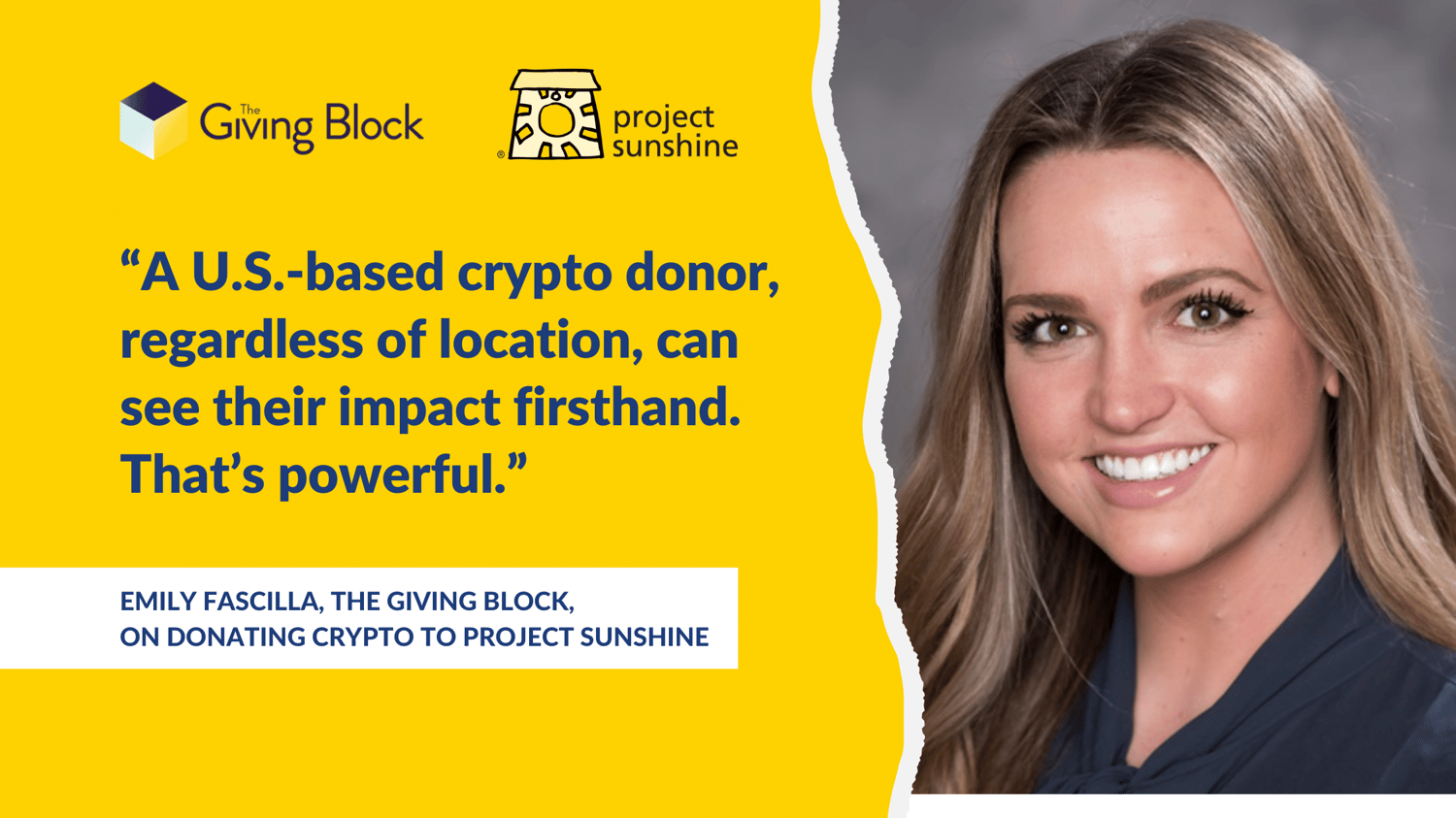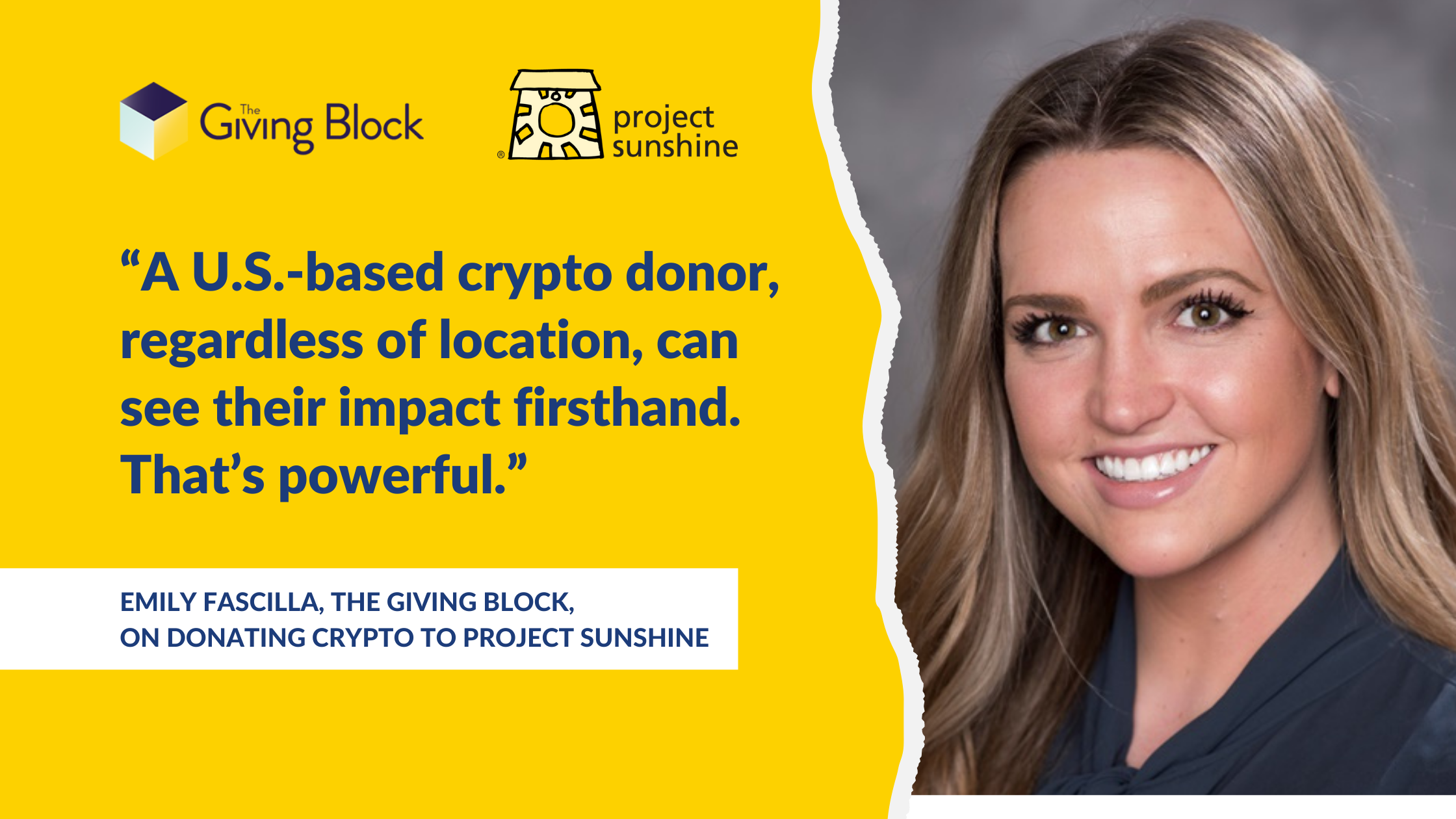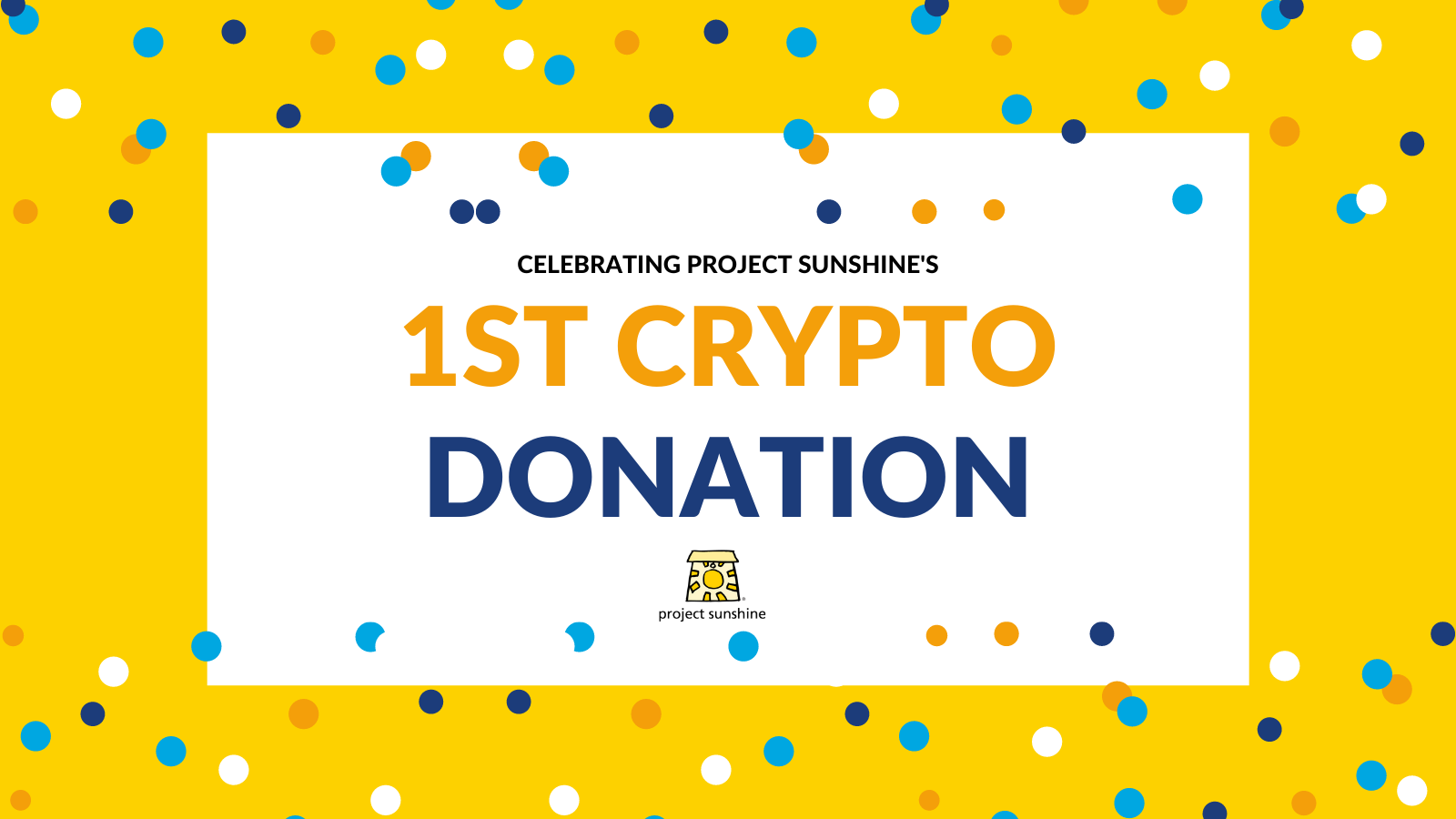We're celebrating this year's Giving Tuesday and #CryptoGivingTuesday, by sitting down with The Giving Block's Emily Fascilla to talk about the future of crypto, NFTs, philanthropy, and how these forces can amplify the power of nonprofits' missions.

As a former non-profit fundraiser and early adopter of crypto giving, what attracted to you to this new form of giving?
The core values of the global education nonprofit I was with at the time of discovering The Giving Block included Audacity, Transparency, and Innovation. These align extremely well with the crypto sector so I was thrilled by the concept of crypto becoming another revenue stream for us. Cryptocurrency is an amazing innovation, blazing trails and solving problems of fiat through its transparency e.g. it can’t be double counted.
As nonprofits, we’re always looking for the same thing in the nonprofit sector, right? More individual donors. There are over 220 million crypto users who are not only individuals, they’re also a younger demographic. The majority of crypto HODLers are Gen-Z and Millennials. The Giving Block was the answer to a question many of us fundraisers ourselves - how do we get more donors? How do we get younger donors?
For us, after more than 20 years of traditional fundraising, it was an exciting choice to partner with The Giving Block to accept crypto donations. How do you see crypto- and NFT-based giving affecting the future of nonprofit fundraising landscape, both short-term and in the long run?
In the short-term, crypto philanthropy is helping nonprofits around the globe increase their impact and get closer to their mission.
In the long-term we have an opportunity to reframe some of the challenges of traditional philanthropy. Crypto is completely decentralized, and we’re seeing crypto donors follow suit by decentralizing their giving. We’ll have a crypto donor give to an organization thousands of miles away because the mission resonated with them, and they were easily able to find them through Twitter. We’re more connected than we have ever been and being able to support nonprofits globally using crypto strengthens that bond.
In just our first year exploring crypto-giving, Project Sunshine has been lucky enough to experience the generosity, optimism, and efficiency of the cryptocurrency and NFT community. Why do you think this community is drawn to a mission like Project Sunshine?
They really are such a generous, optimistic and efficient crowd, aren’t they? It comes down to this: crypto-donors are human beings. Project Sunshine’s mission is one that so many of us can either relate personally to through life and family experiences or be inspired by through hearing about the impact of your work. I also think the importance of healthcare has been top of mind for so many during the pandemic. Support for hospital patients is needed now more than ever. Project Sunshine’s unique and incredible volunteer opportunities around the U.S. is a cherry on top of all of this. A U.S.-based crypto donor regardless of location, could visit one of your sites and see their impact firsthand. That’s powerful.
Crypto and NFT’s have made their way into the mainstream lexicon this past year--in what ways do you think the narrative around crypto to the greater public is correct or incorrect?
It has been so exciting to see crypto become more mainstream, but that awareness certainly can come with misconceptions. That’s why it’s been so exciting to see how many people in the nonprofit sector are getting crypto right. They know it’s an extremely generous community, and they know it’s growing at a rapid pace. Nonprofits have really started to understand that this is an opportunity they don’t want to miss out on. Crypto holders are quickly becoming one of the most generous groups of all time, so it’s great to see more nonprofits paying attention.
I also appreciate how incredibly accessible crypto is as an asset, and I have seen more awareness of this in the greater public recently. You do not need to come from wealth to build wealth. There is no institution controlling how to invest or how much you invest. Crypto is an innovative solution for communities that have been historically excluded from wealth-building or communities that might not be allowed access to fiat currency. For example, a woman in Afghanistan who might not otherwise be allowed access to a bank account can now gain financial freedom through crypto.
For donors who are used to giving in traditional ways and are unfamiliar with cryptocurrencies, is there an advantage to them exploring donating in this way?
Giving crypto is similar to giving stock. The IRS recognizes crypto as a property, so it’s much more beneficial to give your crypto than to give cash. Cryptocurrencies have been around for over 10 years now. Blockchain Technology has some of the most incredible use-cases of any technology we’ve seen in our lifetime. To put it simply: it’s not going anywhere, and it’s something that I think everyone should be open to exploring.
Giving Tuesday is a huge day of non-profits, how does The Giving Block enhance giving opportunities for non-profits during this crucial season?
Too many ways to count! Our team is constantly outreaching to crypto companies, NFT projects, big-name crypto philanthropists to build community around the ethos of Giving Tuesday. We also recently launched our Crypto Adoption Fund and our Crypto Cause Funds which will benefit our nonprofit clients not only during this giving season, but year-round.
When Giving Tuesday was founded, it was founded with the idea of a GLOBAL day of generosity. Nothing is more global than cryptocurrency. So a lot of the synergy is already there, and the TGB team works to create opportunities and partnerships for nonprofits to deeply engage with crypto donors. We’re really leading the way in connecting the world of crypto and the world of philanthropy, and #GivingTuesday and #CryptoGivingTuesday is a huge part of that.
On a more foundational level, our team of Crypto Fundraising Strategists (like me!) work to ensure each of our nonprofits understand the best practices and most effective fundraising and marketing strategies in this new space of crypto philanthropy. We want you to have the tools you need to identify and steward crypto-donors well, and yes, that often means a RT, hashtag, or impact statement on Twitter.
It’s so much fun to pull these new relationships together, and to see our nonprofits, like Project Sunshine, going out and forming their own crypto partnerships. crypto philanthropy is just getting started and we’re honored to be at the forefront of it.
A rising tide lifts all boats. Crypto holders are on the rise, both in how many there are and in building their wealth through cryptocurrency. All nonprofits have the opportunity to be lifted by crypto philanthropy because of the boundary-less accessibility and global community.




-1.png)